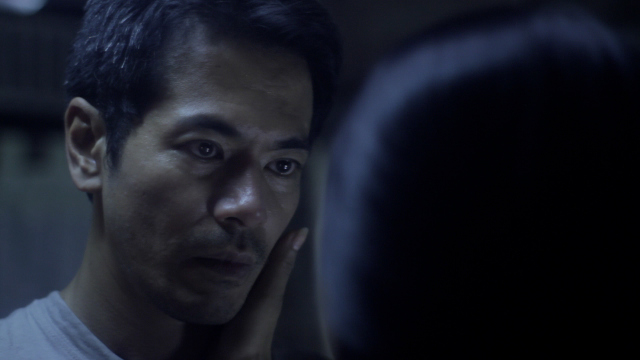SUMMARY
This is AI generated summarization, which may have errors. For context, always refer to the full article.

Here’s another look at British director Sean Ellis’ much-talked about ‘Metro Manila,’ a film vying in the Foreign-Language Film Category of the 2014 Oscars and which began showing in Philippine theaters October 9. You can also check out the reviews of Giselle Tongi-Walters and Carljoe Javier, as well as these Rappler interviews with Ellis, Jake Macapagal, and Althea Vega. – Ed.
MANILA, Philippines – On the surface, “Metro Manila” tells a simple tale that’s all too familiar to us who live in its eponymous metropolis. It presents the travails of a hard-up family who move from their province to the big city hoping for a better life, finding themselves instead in consecutive quagmires that grow direr and direr.
Yet as with its titular city, there’s more to “Metro Manila” than what the eye can see – an agenda, possibly deliberate but perhaps more lucked into, that is fleshed out onscreen as much as off-camera.
For one thing, had none of us been acquainted with the film’s background or had its credits been omitted, we viewers would have assumed that this all-Filipino, Philippines-set flick was made entirely by Filipinos. Yet as anyone who has tracked this movie here on Rappler would know, it’s all under the helm of a Briton, director-writer-cinematographer Sean Ellis. (In the end credits, Ellis dedicates the film to his late mother Erica.)
And in what could be a behind-the-scenes edge for the movie as the United Kingdom’s Best Foreign Language Film entry to the 2014 Academy Awards, Ellis and Caymanian co-writer Frank E. Flowers had written the “Metro Manila” screenplay in their native English but with the cast members obliging in translating their respective dialogues into Filipino.
The 115-minute film itself starts off as deceptively simplistic, almost dry to a point, as a poverty drama. Then halfway through, it morphs into a gritty crime thriller that, while not entirely dropping the first half’s fatalistic bent, percolates into a proactive story, akin to a bruised prizefighter who opts to keep boxing instead of staying knocked-down.
Massive paradox
As Ellis himself shot them, the movie’s settings are no less portraits of duality. The opening locale, Banaue, is such a panorama but is also depicted as wanting in financial security for any family – such as that of the lead protagonist, a farmer named Oscar Ramirez (played by Jake Macapagal).
The film’s main setting, Metro Manila itself, is constantly presented as a beautiful monstrosity and a massive paradox, the towering skylines of Makati’s central business district constantly juxtaposed with unspecified slum areas. It’s as if Ellis is subtly asking: How can such squalor and splendor coexist, with one alternately dwarfing the other?
Thankfully, the 43-year-old filmmaker does not necessarily force the issue, in general letting the proceedings speak for itself. And “Metro Manila’s” unfolding story does stick to its undeclared sense of duality, right down to the characters.
For one thing: Forced to make ends meet while raising two very young children, Oscar’s wife Mai (Althea Vega) ends up taking a strip-joint job, thereby depicting many an actual “night club” worker’s role as both onstage entertainer and offstage mother. The mild-mannered Oscar lands employment as an armored-truck driver and his immediate boss, Douglas Ong, is slowly unveiled as a duplicitous character; but as played by the swell John Arcilla (who gets to showcase himself far more here than he did with the partly Manila-set “The Bourne Legacy”), the character with his concealed underbelly still unfolds as a welcome surprise.
Oscar himself, essayed by Macapagal with convincing, wide-eyed naïveté, maintains a hushed, mild-mannered stance throughout “Metro Manila,” yet undergoes a simmering transformation from being seemingly hapless into someone finally able to take matters into his own, largely uncorrupted hands.

At one point, Arcilla’s Ong points out that the state lottery is all about the hope of winning, nothing more. Ellis, through Macapagal’s Oscar, realizes that sense of hope further with what could be “Metro Manila’s” best takeaway: that no matter how desperate one’s lot in life is, there will always be a way out of the rut if you work or search hard enough. While the movie’s conclusion, i.e., Oscar’s road to material redemption, is questionable in several ways, it is the film’s highest point, a nifty twist that must have sealed the deal with regard to “Metro Manila’s” Audience Award victory at the 2013 Sundance Film Festival.
Amid its almost languid feel, “Metro Manila” does have a few moments when it truly comes alive, often in not-so-bombastic ways.
A case in point is when Oscar is first grilled by his and Ong’s big boss, a man nicknamed Laughing Buddha, who requires his applicants to crack a joke during job interviews. The gag Oscar delivers is old school but the moment – a paragon of understated interplay between Macapagal and Moises Magisa as the laugh-hungry employer – is electric. And there is the recurring, parallel subplot involving a wronged entrepreneur’s son (JM Rodriguez) that adds to “Metro Manila’s” colorful, if tragic, overtones.
“Metro Manila” is a work of fiction, yet it is based on real places and real-life archetypes. The film is essentially a drama about familial love yet later on indulges in noirish tendencies. It is mainly the work of an international filmmaker who, while telling a story that could have been set elsewhere, managed to concoct a believable slice of Pinoy life – and, in the process, offers added proof that films about our country can be rife with relevant substance than needless artifice.
All told, “Metro Manila” suggests that people, places, or situations are never as plain as they seem – and that such complexity, burdensome as it can be, is what makes life, like decent enough movies, worth seeing through to its very end. – Rappler.com
Add a comment
How does this make you feel?
There are no comments yet. Add your comment to start the conversation.